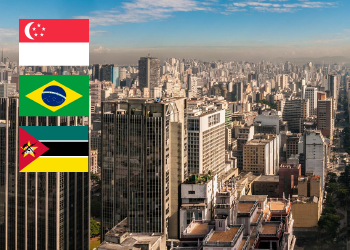Advancements in global intellectual property cooperations

Advancements in cooperations between IP offices continue to expand opportunities for applicants across the globe. Among the most successful collaborations are Patent Prosecution Highways (PPH), aiming to improve the efficiency and speed of the prosecution process.
The PPH agreement between the Brazilian Patent and Trademark Office (BPTO) and the Intellectual Property Office of Singapore (IPOS) was agreed upon on April 20, 2020, and enforced on May 1, 2020. The program will run until April 30, 2025, allowing for an expedited examination for applicants who qualify. This is achieved by the sharing of examination results between the offices, leading to a faster turn-around time for patent applications. In Brazil, participation in all PPH programs is limited to a maximum of 400 applications per year, allowing for only one application per person on a monthly basis. Brazil currently has PPH programs with 22 IP offices inclusive of the IP offices in the USA, China, Japan, and the EPO.
Also taking steps towards enhancing international collaboration, the Industrial Property Institute (IPI) of Mozambique deposited its instruments of accession to the Banjul Protocol on Marks with the Director General of ARIPO on May 15, 2020. The protocol is managed by the African Regional Intellectual Property Organization (ARIPO), an organisation initially created with the aim of allowing African countries to combine their resources within the IP field. The Banjul Protocol itself facilitates a centralised filing system for trademark applications whereby a single application may be filed in the English language, either to a national office of a contracting party or to the ARIPO office directly. As of August 15, 2020, Mozambique will be eligible for designation in ARIPO trademark applications. With Mozambique on board, the total number of member states now constitutes 11 and also includes Botswana, Eswatini, Lesotho, Liberia, Malawi, Namibia, Sao Tome and Principe, Tanzania, Uganda, and Zimbabwe.
Introducing a brand new international cooperation, the Beijing Treaty on Audiovisual Performances entered into force on April 28, 2020, three months after the 30th ratification by Indonesia on January 28, 2020. The multilateral treaty aims to regulate copyright for audiovisual performances and expand the rights of performers in this regard, with a specific focus on the rights of reproduction, distribution, rental, making performance material available to the public and broadcasting. Originally adopted on June 26, 2012, the Treaty remains quite controversial having been widely supported and criticized at the same time. While many major countries are yet to join, the treaty pins a start in changing the copyright regulations for audiovisual performances on a global scale.
International cooperations between IP offices prove vital to the modernisation of the intellectual property field and in securing rights for applicants. With the use of PPH agreements, treaties, and protocols, it is hoped that the increased ease of securing rights for applicants will encourage further filings across the board.